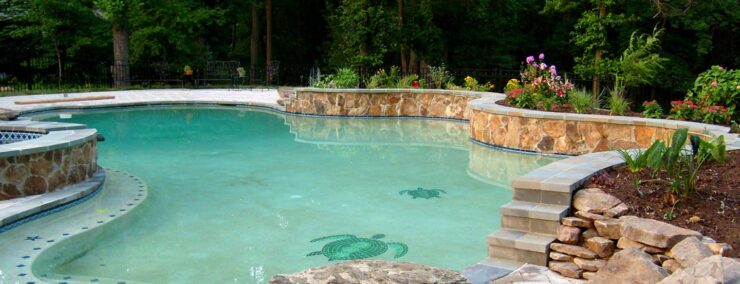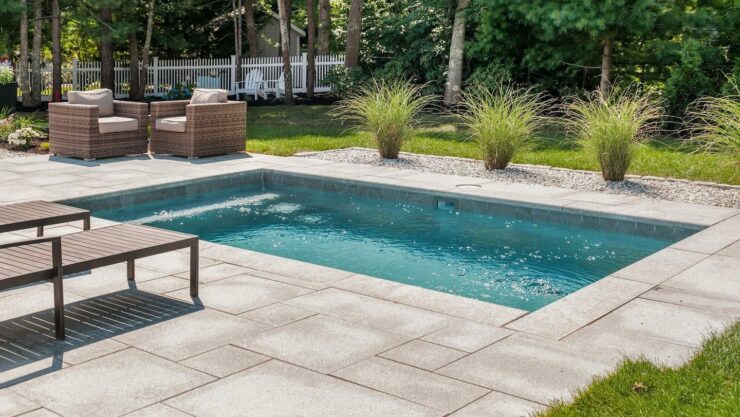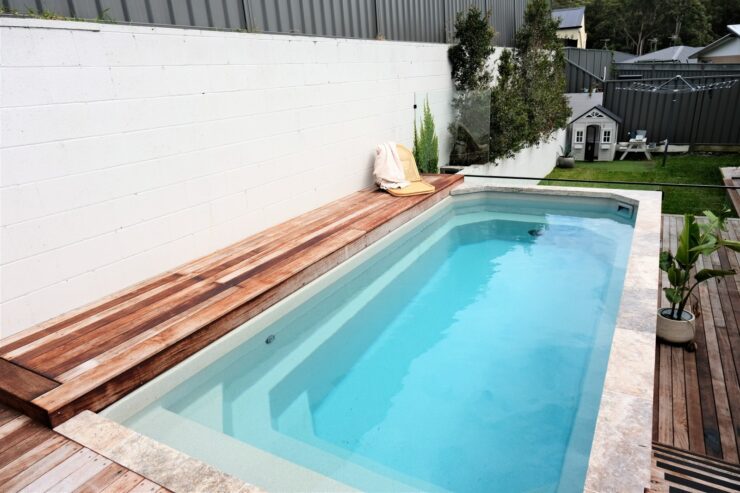Table of Contents
If you live in New Jersey and have a modest backyard, you might be contemplating how to best utilize your outdoor space. One increasingly popular option is the plunge pool, a sleek and stylish alternative to traditional swimming pools.
Designed with small properties in mind, plunge pools provide a refreshing retreat while requiring significantly less space. This article will explore the costs associated with plunge pools, the features that can elevate their design, and why they are the perfect fit for homes along the Jersey Shore.
What is a Plunge Pool?

A plunge pool is a compact swimming pool that typically features a depth of around 5 to 7 feet. These pools are designed mainly for relaxation and cooling off rather than swimming laps. They can often include benches, jets, or waterfalls, making them not just a place to swim but an aesthetic feature that enhances your outdoor environment.
Plunge pools are especially appealing for homeowners with limited space because they can fit in areas that larger pools cannot, transforming compact yards into luxurious retreats.
The Rising Trend of Plunge Pools in New Jersey
Plunge pools have gained significant traction in New Jersey, particularly in coastal areas where properties can be small. The allure of having a personal oasis to retreat to during scorching summer days is irresistible. On the Jersey Shore, where social gatherings and family fun emerge frequently, a plunge pool can transform a small yard into a vibrant gathering space.
Understanding the Cost of Plunge Pools
When considering a plunge pool installation, homeowners should anticipate costs that typically start at around $60,000. However, this figure can vary significantly based on numerous factors, including size, design features, location, and landscaping considerations.
Factors Influencing Plunge Pool Costs

- Size and Design: The dimensions and shape of your plunge pool are critical in determining the overall cost. Custom shapes and configurations may increase expenses, as they often require specialized construction methods. A standard rectangular or square plunge pool will generally cost less than a uniquely shaped one.
- Materials: The construction materials you choose for your plunge pool significantly impact its overall price. Common materials include fiberglass, vinyl, and concrete. While fiberglass pools are often quicker to install and maintain, concrete may provide more customization options but can be pricier.
- Location and Accessibility: The geography of your property can affect installation costs. If a construction site is challenging to access, or if unique landscaping is required, these elements can increase labor charges.
- Additional Features: Many homeowners opt for various features such as waterfalls, mood lighting, and spa jets, which enhance the swimming experience but can also increase costs. Each additive not only raises the initial price but may also add to maintenance expenses over time.
The Hidden Costs Dilemma
While the base price for plunge pools can seem relatively straightforward, many companies often employ pricing tactics that can catch buyers off guard. Unscrupulous competitors may advertise significantly lower rates, enticing prospects into believing they are getting a bargain.
However, once the sale is underway, customers are frequently presented with a slew of additional fees for necessities like installation upgrades, plumbing, and electrical connections.
To avoid these pitfalls, homeowners should seek a detailed breakdown of the entire process. Understanding the potential upcharges and how they correlate to the final price is vital to maintaining your budget. A transparent and detailed estimate from your installer can help eliminate surprises and foster trust.
Advantages of Having a Plunge Pool

Apart from their aesthetic appeal and practicality, plunge pools come with several advantages that make them an excellent choice for small yards.
Space Efficiency
Plunge pools are designed to be compact, making them perfect for smaller backyards where conventional pools would take up too much space. They create a luxurious vacation feel without consuming all available space, allowing homeowners to retain a usable area for other outdoor activities such as seating, grilling, or gardening.
Aesthetic Appeal
Many homeowners appreciate the visual impact of plunge pools, often integrating them seamlessly into outdoor landscapes. With various design options, colors, and materials available, you can customize your plunge pool to reflect your style. Whether you prefer a modern, geometric look or a more natural feel with integrated stonework and greenery, the possibilities are endless.
Low Maintenance
Compared to larger pools, plunge pools typically require less maintenance. Their smaller size means fewer materials to clean, less water to treat, and reduced electricity costs associated with heating and filtration. This can be particularly beneficial for homeowners seeking a relaxing retreat rather than a full-time commitment to pool upkeep.
Essential Features to Consider
When planning your plunge pool, consider including these luxurious features that elevate the overall experience:
- Built-In Seating: Many plunge pools incorporate benches or loungers, allowing for comfortable relaxation without needing extra poolside furniture.
- Water Features: Adding water features such as fountains or waterfalls not only enhances the pool’s aesthetics but also creates a soothing ambiance, making your outdoor space feel like a tranquil getaway.
- Heating Options: A heating system can extend the swimming season, and options like solar heaters provide eco-friendly solutions to keep the water warm.
- Lighting: Install LED lights in or around the pool to create a striking atmosphere during evening gatherings. This allows for entertaining long after the sun has set.
- Landscaping: Surrounding your plunge pool with greenery or decorative stones can integrate it into your landscape design, making it a focal point of your backyard.
Planning Your Plunge Pool Installation
Before beginning the installation of a plunge pool, thorough planning and research are essential. Begin with the following steps:
- Set a Budget: Determine what you can afford to spend on your plunge pool and be prepared for additional costs that may arise.
- Choose Your Contractor Wisely: Look for reputable contractors with experience in plunge pool installations. Read reviews, ask for references, and see past projects to gauge the quality of work.
- Design Your Pool: Work with professionals to design a pool that fits your style and yard. Consider factors such as shape, depth, and materials in the design stage.
- Obtain Necessary Permits: Pool installation usually requires permits, so check with local regulations and obtain the necessary documentation before construction begins.
Conclusion
Installing a plunge pool in your New Jersey backyard is a fantastic way to enhance your outdoor experience, especially if you have limited space. With plunge pool costs generally starting around $60,000, understanding these expenses and potential add-ons is crucial for maintaining your budget.
Throughout the planning and installation process, ensure you keep an eye out for hidden costs and seek transparency from your contractor. A plunge pool can bring relaxation, beauty, and a small oasis right to your home, perfect for enjoying those warm Jersey Shore summers.
Whether you opt for added features or a standard design, the right plunge pool will provide a refreshing escape in the comfort of your own backyard.

